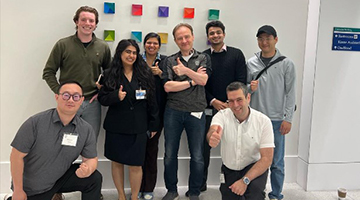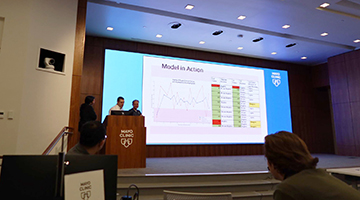UNF professor’s AI solution involving electrolyte replacement therapy wins Mayo Clinic Datathon
 A University of North Florida professor with an innovative artificial intelligence solution in healthcare was part of a team that won first place at the Mayo Clinic Datathon and Data Summit 2025.
A University of North Florida professor with an innovative artificial intelligence solution in healthcare was part of a team that won first place at the Mayo Clinic Datathon and Data Summit 2025.
As part of the team, Dr. Chady Ghnatios, advanced manufacturing and materials innovation assistant professor, built a digital AI twin to help healthcare providers make optimal decisions in electrolyte replacement therapy in an intensive care unit (ICU) setting.
The digital twin is created by feeding data on electrolyte replacement from thousands of patient cases and using various factors – such as age, sex, weight, etc - to determine potential outcomes of treatments. Another tool operates on reinforcement learning to suggest the best possible courses of treatment.
Electrolyte replacement therapy focuses on correcting imbalances in essential minerals like potassium, magnesium and phosphate. Electrolytes are crucial for the function of the heart, muscles, nerves and blood clotting. ICU patients are frequently at risk of electrolyte imbalances, which can lead to serious complications.
Creating a reinforcement learning tool to make optimal decisions can help standardize electrolyte replacement, ensure timely and uniform care and reduce the risk of adverse events.
Ghnatios’ team included one undergraduate student from UNF and one from MIT, one doctoral student from Duke, one attending (medical doctor) from Mayo Clinic Rochester and two fellows (medical doctors in training) from Mayo Clinic in Jacksonville.
 The Mayo Clinic Datathon is a two and a half-day immersive event held at Mayo Clinic in Jacksonville that brings together multidisciplinary teams of physicians, scientists, fellows, residents, healthcare executives, nurse practitioners, physician assistants, pharmacists and students from around the country to develop innovative solutions using healthcare data.
The Mayo Clinic Datathon is a two and a half-day immersive event held at Mayo Clinic in Jacksonville that brings together multidisciplinary teams of physicians, scientists, fellows, residents, healthcare executives, nurse practitioners, physician assistants, pharmacists and students from around the country to develop innovative solutions using healthcare data.
The event ran from April 4 to April 6 and started with a one-day data summit, featuring keynote addresses, panel discussions and workshops on AI, data sharing and ethical issues in healthcare. The following two days were dedicated to the datathon competition, where teams comprised of healthcare professionals and experts from computer science, engineering and mathematics collaborate to solve critical clinical problems using real-world datasets.
Ghnatios also had the opportunity to connect with guest speakers from the Massachusetts Institute of Technology, and he accepted their invitation to join a team that is building a virtual lab testing tool at MIT. Ghnatios hopes this is the beginning of a great new collaboration between UNF, MIT and Mayo Clinic.
